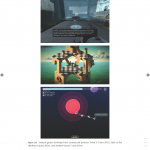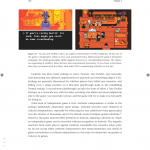Chris Richardson was kind enough to interview me about The Art of Failure for his This is not a Pipe podcast series.
https://www.tinapp.org/episodes/artoffailure
On the page I also mention some of the books that have inspired me as a writer.
My name is Jesper Juul, and I am a Ludologist [researcher of the design, meaning, culture, and politics of games]. This is my blog on game research and other important things.
Chris Richardson was kind enough to interview me about The Art of Failure for his This is not a Pipe podcast series.
https://www.tinapp.org/episodes/artoffailure
On the page I also mention some of the books that have inspired me as a writer.
Here are all the published papers from the 2019 DiGRA conference.
For Handmade Pixels, I did a rather extensive series of interviews with developers and festival organizers.
I was interested in general questions of how they framed their own role and how they saw the history of independent games, as well as in the concrete details of their development or festival-organizing practices.
I am dropping half the interviews now, and will publish the rest during the later months of 2019.
| Anna Anthropy
Game designer known for games such as Dys4ia, author of the Rise of the Videogame Zinesters manifesto. |
Bennett Foddy
Educator and game developer behind punishing games such as QWOP and Getting over it with Bennett Foddy. |
|
| Bernie DeKoven
Pioneer in physical and communal games, including with the New Games movement. |
Celia Pearce
Educator, writer and game developer who has worked with games, VR, and multimedia since the late 1980s. |
|
| David Kanaga
Composer and game developer of games such as Proteus and Oikospiel. |
Jason Rohrer
Independent game developer of games such as Passage and One Hour One Life. |
|
| Jonathan Blow
Independent game developer, best known for Braid and The Witness. |
Kelly Wallick
Chairperson of the Independent Games Festival since 2015, CEO and founder of Indie MEGABOOTH. |
|
| Tale of Tales
Belgium-based artist duo—Auriea Harvey and Michaël Samyn—known for their earlier work with experimental and experiential games such as The Path and The Graveyard. |
![]() I am thrilled to announce that my new book, Handmade Pixels: Independent Video Games and the Quest for Authenticity, is out today on MIT Press.
I am thrilled to announce that my new book, Handmade Pixels: Independent Video Games and the Quest for Authenticity, is out today on MIT Press.
How can a digital, immaterial, and globally distributed video game be authentic?
Video games are often dismissed as mere entertainment products created by faceless corporations. The last twenty years, however, have seen the rise of independent, or “indie,” video games: a wave of small, cheaply developed, experimental, and personal video games that react against mainstream video game development and culture. In Handmade Pixels, I examine the paradoxical ways developers, players, and festivals portray independent games as unique and hand-crafted objects in a globally distributed digital medium.
 But where did independent games come from? Are they independent, just like cinema and music? I tell the history of independent video games from 1998-2018, and show the ongoing tensions around what indie games should be: Fun games? Games with political impact? Games representing diversity? Are indie games a movement for more democratic games, or do they speak only to a small audience of connoisseurs?
But where did independent games come from? Are they independent, just like cinema and music? I tell the history of independent video games from 1998-2018, and show the ongoing tensions around what indie games should be: Fun games? Games with political impact? Games representing diversity? Are indie games a movement for more democratic games, or do they speak only to a small audience of connoisseurs?
I describe all of this as a continued quest for authenticity – a quest to distance indie games from big publishers, from traditional game form, and from the lack of diversity in big-budget and casual games.
 This is a trade book for a broad audience, but with theoretical underpinnings. It shows many strange new games in detail, it contains stories from my own participation in game jams and conferences, it is lavishly illustrated with more than 100 color pictures, and it features interviews with 21 developers and festival organizers (Jonathan Blow, Anna Anthropy, Bennett Foddy, Simon Carless, Nathalie Lawhead, and more).
This is a trade book for a broad audience, but with theoretical underpinnings. It shows many strange new games in detail, it contains stories from my own participation in game jams and conferences, it is lavishly illustrated with more than 100 color pictures, and it features interviews with 21 developers and festival organizers (Jonathan Blow, Anna Anthropy, Bennett Foddy, Simon Carless, Nathalie Lawhead, and more).
The book took a lot of work, but it was also fun to write, as it gave me the chance to play hundreds of fascinating games, and to connect with interesting people in the independent game community. I hope you will enjoy it too.
Upcoming talks
I will be presenting the book at the NYU Game Center on October 10th, and at IndieCade in Los Angeles on October 12th.
Get the book
Handmade Pixels is available from (preferably?) your local independent bookstore, MIT Press, or any number of online retailers.
Official MIT Press site: https://mitpress.mit.edu/books/handmade-pixels
My own book site, with the full developer interviews. https://www.jesperjuul.net/handmadepixels/
![]() I will be presenting my new book, Handmade Pixels, on October 10th 2019 at the New York University Game Center.
I will be presenting my new book, Handmade Pixels, on October 10th 2019 at the New York University Game Center.
“Join us to celebrate the launch of Jesper Juul’s latest publication, Handmade Pixels! Handmade Pixels: Independent Video games and the Quest for Authenticity is the new book (MIT Press) from video game researcher Jesper Juul, about the history and idea of independent video games.
Through examples of many interesting and strange games, and through audience participation, I will tell the history of independent games, and point to their ongoing challenges: What happens when players deny that an experimental independent game is a “real game”? Are experimental independent video games for everyone, or only for a small group of connoisseurs? Can we continue to make new video games by referring to older analog or digital visual styles? How can we create authenticity in a thoroughly digital world?”
Get your tickets here.
“This Action Will Have Consequences”: Interactivity and Player Agency
by Sarah Stang
This article discusses interactivity and player agency in video games and uses BioShock and The Walking Dead as case studies to explore ways in which developers connect morality and the illusion of player agency. It also discusses the ways in which players have exercised agency by engaging with fan communities and making demands of game developers.[more]
Novel Subjects: Robinson Crusoe & Minecraft and the Production of Sovereign Selfhood
by Phillip Lobo
A comparative analysis of Robinson Crusoe and Minecraft as works of formal realism, with a focus on subjectivity-generation and sovereignty.[more]
Older adults’ digital gameplay, social capital, social connectedness, and civic participation
by Yu-Hao Lee
Can older adults maintain social connectedness, social capital, and civic participation through playing games? This study found that older adults who played with local and distant ties reported higher social connectedness and social capital. Playing with online friends was associated with more bridging social capital and more civic participation.[more]
The right way to play a game
by C. Thi Nguyen
Is there a right way to play a game? Some have argued that, by following the rules, we give too much weight to the author’s intent and destroy the freedom of play. I argue that the rules are essential for shared experience. They make possible the communication of sculpted experiences of activity.[more]
Venturing into the House of Digital Horrors: A Review of The World of Scary Video Games
by Daniel Vella
The World of Scary Video Games: a Study in Videoludic Horror (2018) by Bernard Perron. New York : Bloomsbury Academic. ISBN: 9781501316210, 1501316214. 488 pp.[more]
Are virtual reality objects real? I have a new paper out in the Disputatio journal, titled Virtual Reality: Fictional all the Way Down (and that’s OK) .
The paper came about as a response to David Chalmer’s 2017 paper The Virtual and the Real, about which Pawel Grabarczyk organized a seminar in Copenhagen in the summer of 2018.
TL;DR: Chalmers uses virtual reality to argue that there are structures (such as calculators) that exist regardless of their physical or non-physical implementation, and as such virtual reality objects can be perfectly real.
I argue, orthogonally, that virtual reality is not becoming “just-like-the-real-thing” based on any fidelity to the physical world. VR is not just technology, but art; a human act of communication and selective implementation. I also argue that VR is half-real: we are not magically transported to another world, as VR is only selectively implemented (it rarely has the photons that make up light, for example), and as users we we are conscious of how the world is a limited implementation made for the purpose of a particular experience.
Here I am interviewed by David Wolinsky as part of his No Don’t Die series.
“In the first half of our conversation, we discuss what people deeply immersed in videogame culture don’t understand about people who don’t play for any number of reasons, how that disconnect stunts the medium’s growth and acceptance, and why the image of people who play videogames was once seen as being predominantly young and male — why that went away and then came back.”
And part two:
“In the second half of our conversation, we talk about how game critics frequently don’t have a grasp on the medium’s history and how that ripples out into broader conversations about games that become more circular then they ought to be, how exploring parallel topics in other industries isn’t always helpful or instructive, and much more.”